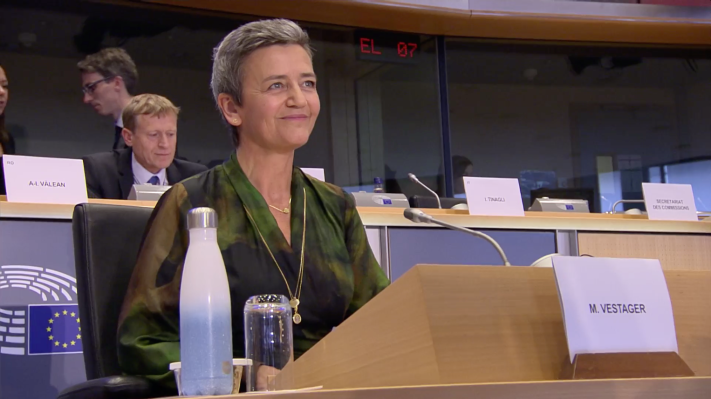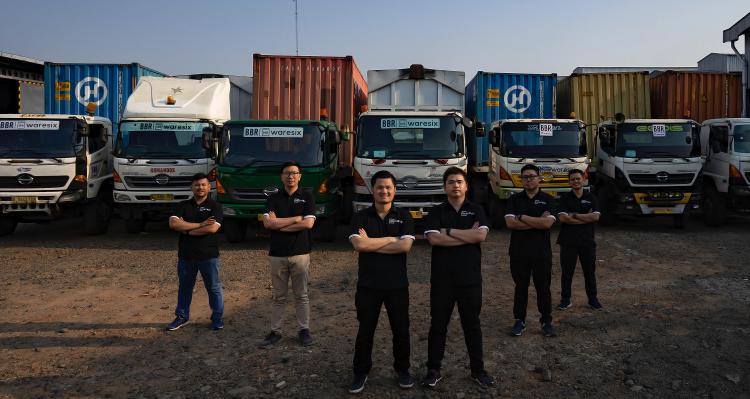Europe’s competition commissioner Margrethe Vestager, set for a dual role in the next Commission, faced three hours of questions from members of four committees in the European Parliament this afternoon, as MEPs got their chance to interrogate her priorities for a broader legislative role that will shape pan-EU digital strategy for the next five years.
As we reported last month, Vestager is headed for an expanded role in the incoming European Commission with president-elect Ursula von der Leyen picking her as an executive VP overseeing a new portfolio called “Europe fit for the digital age.”
She is also set to retain her current job as competition commissioner. And a question she faced more than once during today’s hearing in front of MEPs, who have a confirming vote on her appointment, was whether the combined portfolio wasn’t at risk of a conflict of interest?
Or whether she “recognized the tension between objective competition enforcement and industrial policy interests in your portfolio,” as one MEP put it, before asking whether she would “build Chinese walls” within it to avoid crossing the streams of enforcement and policymaking.
Vestager responded by saying it was the first question she’d asked herself on being offered the role — before laying out flat reasoning that “the independence in law enforcement is non-negotiable.”
“It has always been true that the commissioner for competition has been part of the College. And every decision we take also in competition is a collegial decision,” she said. “What justifies that is of course that every decision is subject to not one but 2x legal scrutiny if need be. And the latest confirmation of this set up was two judgments in 2011 — where it was looked into whether this set up… is in accordance with our human rights and that has been found to be so. So the set up, as such, is as it should be.”
The commissioner and commissioner-designate responded capably to a wide range of questions reflecting the broad span of her new responsibilities — fielding questions on areas including digital taxation; platform power and regulation; a green new deal; AI and data ethics; digital skills and research; and small business regulation and funding, as well as queries around specific pieces of legislation (such as ePrivacy and Copyright Reform).
Climate change and digital transformation were singled out in her opening remarks as two of Europe’s biggest challenges — ones she said will require both joint working and a focus on fairness.
“Europe is filled with highly skilled people, we have excellent infrastructure, fair and effective laws. Our Single Market gives European businesses the room to grow and innovate, and be the best in the world at what they do,” she said at the top of her pitch to MEPs. “So my pledge is not to make Europe more like China, or America. My pledge is to help make Europe more like herself. To build on our own strengths and values, so our society is both strong and fair. For all Europeans.”
Building trust in digital services
In her opening remarks Vestager said that if confirmed she will work to build trust in digital services — suggesting regulation on how companies collect, use and share data might be necessary to ensure people’s data is used for public good, rather than to concentrate market power.
It’s a suggestion that won’t have gone unnoticed in Silicon Valley.
“I will work on a Digital Services Act that includes upgrading our liability and safety rules for digital platforms, services and products,” she pledged. “We may also need to regulate the way that companies collect and use and share data — so it benefits the whole of our society.”
“As global competition gets tougher we’ll need to work harder to preserve a level playing field,” she also warned.
But asked directly during the hearing whether Europe’s response to platform power might include breaking up overbearing tech giants, Vestager signaled caution — saying such an intrusive intervention should only be used as a last resort, and that she has an obligation to try less drastic measures first. (It’s a position she’s set out before in public.)
“You’re right to say fines are not doing the trick and fines are not enough,” she said in response to one questioner on the topic. Another MEP complained fines on tech giants are essentially just seen as an “operating expense.”
Vestager went on to cite the Google AdSense antitrust case as an example of enforcement that hasn’t succeeded because it has failed to restore competition. “Some of the things that we will of course look into is do we need even stronger remedies for competition to pick up in these markets,” she said. “They stopped their behavior. That’s now two years ago. The market hasn’t picked up. So what do we do in those kind of cases? We have to consider remedies that are much more far reaching.
“Also before we reach for the very, very far reaching remedy to break up a company — we have that tool in our toolbox but obviously it is very far reaching… My obligation is to ensure that we do the least intrusive thing in order to make competition come back. And in that respect, obviously, I am willing to explore what do we need more, in competition cases, for competition to come back.”
Competition law enforcers in Europe will have to consider how to make sure rules enforce fair competition in what Vestager described as a “new phenomenon” of “competition for a market, not just in a market” — meaning that whoever wins the competition becomes “the de facto rule setter in this market.”
Regulating platforms on transparency and fairness is something on which European legislators have already agreed — earlier this year. Though that platform to business regulation has yet to come into force. “But it will also be a question for us as competition law enforcers,” Vestager told MEPs.
Making use of existing antitrust laws but doing so with greater speed and agility, rather than a drastic change of competition approach, appeared to be her main message — with the commissioner noting she’d recently dusted off interim measures in an ongoing case against chipmaker Broadcom; the first time such an application has been made for 20 years.
“It’s a good reflection of the fact that we find it a very high priority to speed up what we do,” she said, adding: “There’s a limit as to how fast law enforcement can work, because we will never compromise on due process — on the other hand we should be able to work as fast as possible.”
Her responses to MEPs on platform power favored greater regulation of digital markets (potentially including data), markets which have become dominated by data-gobbling platforms — rather than an abrupt smashing of the platforms themselves. So not an Elizabeth Warren “existential” threat to big tech, then, but from a platform point of view Vestager’s preferred approach might just sum to death by a thousand legal cuts.
“One of course could consider what kind of tools do we need?,” she opined, talking about market reorganization as a means of regulating platform power. “[There are] different ways of trying to re-organize a marketplace if the competition authority finds that the way it’s working is not beneficial for fair competition. And those are tools that can be considered in order to sort of re-organize before harm is done. Then you don’t punish because no infringement is found but you can give very direct almost orders… as to how a market should be organized.”
Artificial intelligence with a purpose
On artificial intelligence — which the current Commission has been working on developing a framework for ethical design and application — Vestager’s opening remarks contained a pledge to publish proposals for this framework — to “make sure artificial intelligence is used ethically, to support human decisions and not undermine them” — and to do so within her first 100 days in office.
That led one MEP to question whether it wasn’t too ambitious and hasty to rush to control a still emerging technology. “It is very ambitious,” she responded. “And one of the things that I think about a lot is of course if we want to build trust then you have to listen.
“You cannot just say I have a brilliant idea, I make it happen all over. You have to listen to people to figure out what would be the right approach here. Also because there is a balance. Because if you’re developing something new then — exactly as you say — you should be very careful not to over-regulate.
“For me, to fulfill these ambitions, obviously we need the feedback from the many, many businesses who have taken upon them to use the assessment list and the principles [recommended by the Commission’s HLEG on AI] of how to create AI you can trust. But I also think, to some degree, we have to listen fast. Because we have to talk with a lot of different people in order to get it right. But it is a reflection of the fact that we are in hurry. We really need to get our AI strategy off the ground and these proposals will be part of that.”
Europe could differentiate itself — and be “a world leader” — by developing “AI with a purpose,” Vestager suggested, pointing to potential applications for the tech such as in healthcare, transportation and combating climate change, which she said would also work to further European values.
“I don’t think that we can be world leaders without ethical guidelines,” she said of AI. “I think we will lose it if we just say no let’s do as they do in the rest of the world — let’s pool all the data from everyone, no matter where it comes from, and let’s just invest all our money. I think we will lose out because the AI you create because you want to serve humans. That’s a different sort of AI. This is AI with a purpose.”
On digital taxation — where Vestager will play a strategic role, working with other commissioners — she said her intention is to work toward trying to achieve global agreement on reforming rules to take account of how data and profits flow across borders. But if that’s not possible she said Europe is prepared to act alone — and quickly — by the end of 2020.
“Surprising things can happen,” she said, discussing the challenge of achieving even an EU-wide consensus on tax reform, and noting how many pieces of tax legislation have already been passed in the European Council by unanimity. “So it’s not undoable. The problem is we have a couple of very important pieces of legislation that have not been passed.
“I’m still kind of hopeful in the working way that we can get a global agreement on digital taxation. If that is not the case, obviously we will table and push for a European solution. And I admire the Member States who’ve said we want a European or global solution, but if that isn’t to be we’re willing to do that by ourselves in order to be able to answer to all the businesses who pay their taxes.”
Vestager also signaled support for exploring the possibility of amending Article 116 of the Treaty on the Functioning of the EU, which relates to competition-based distortion of the internal market, in order to enable tax reform to be passed by a qualified majority, instead of unanimously — as a potential strategy for getting past the EU’s own current blocks to tax reform.
“I think definitely we should start exploring what would that entail,” she said in response to a follow-up question. “I don’t think it’s a given that it would be successful, but it’s important that we take the different tools that the treaty gives us and use these tools if need be.”
During the hearing she also advocated for a more strategic use of public procurement by the EU and Member States — to push for more funding to go into digital research and business innovation that benefits common interests and priorities.
“It means working together with Member States on important projects of common European interest. We will bring together entire value chains, from universities, suppliers, manufacturers all the way to those who recycle the raw material that is used in manufacturing,” she said.
“Public procurement in Europe is… a lot of money,” she added. “And if we also use that to ask for solutions well then we can have also maybe smaller businesses to say I can actually do that. So we can make an artificial intelligence strategy that will push in all different sectors of society.”
She also argued that Europe’s industrial strategy needs to reach beyond its own Single Market — signaling a tougher approach to market access to those outside the bloc.
And implying she might favor less of a free-for-all when it comes to access to publicly funded data — if the value it contains risks further entrenching already data-rich, market-dominating giants at the expense of smaller local players.
“As we get more and more interconnected, we are more dependent and affected by decisions made by others. Europe is the biggest trading partner of some 80 countries, including China and the U.S. So we are in a strong position to work for a level global playing field. This includes pursuing our proposal to reform the World Trade Organization. It includes giving ourselves the right tools to make sure that foreign state ownership and subsidies do not undermine fair competition in Europe,” she said.
“We have to figure out what constitutes market power,” she went on, discussing how capacity to collect data can influence market position, regardless of whether it’s directly linked to revenue. “We will expand our insights as to how this works. We have learned a lot from some of the merger cases that we have been doing to see how data can work as an asset for innovation but also as a barrier to entry. Because if you don’t have the right data it’s very difficult to produce the services that people are actually asking for. And that becomes increasingly critical when it comes to AI. Because once you have it then you can do even more.
“I think we have to discuss what we do with all the amazing publicly funded data that we make available. It’s not to be overly biblical but we shouldn’t end up in a situation where ‘those who have shall more be given.’ If you have a lot already then you also have the capabilities and the technical insight to make very good use of it. And we do have amazing data in Europe. Just think about what can be assessed in our supercomputers… they are world-class… And second when it comes to both [EU sat-nav] Galileo and [earth observation program] Copernicus. Also here data is available. Which is an excellent thing for the farmer doing precision farming and saving in pesticides and seeds and all of that. But are really happy that we also make it available for those who could actually pay for it themselves?
“I think that is a discussion that we will have to have — to make sure that not just the big ones keep taking for themselves but the smaller ones having a fair chance.”
Rights and wrongs
During the hearing Vestager was also asked whether she supported the controversial EU copyright reform.
She said she supports the “compromise” achieved — arguing that the legislation is important to ensure artists are rewarded for the work they do — but stressed that it will be important for the incoming Commission to ensure Member States’ implementations are “coherent” and that fragmentation is avoided.
She also warned against the risk of the same “divisive” debates being reopened afresh, via other pieces of legislation.
“I think now that the copyright issue has been settled it shouldn’t be reopened in the area of the Digital Services Act,” she said. “I think it’s important to be very careful not to do that because then we would lose speed again when it comes to actually making sure there is remuneration for those who hold copyright.”
Asked in a follow-up question how, as the directive gets implemented by EU Member States, she will ensure freedom of speech is protected from upload filter technologies — which is what critics of the copyright reform argue the law effectively demands that platforms deploy — Vestager hedged, saying: “[It] will take a lot of discussions and back and forth between Member States and Commission, probably. Also this parliament will follow this very closely. To make sure that we get an implementation in Member States that are similar.”
“One has to be very careful,” she added. “Some of the discussions that we had during the adoption of the copyright directive will come back. Because these are crucial debates. Because it’s a debate between the freedom of speech and actually protecting people who have rights. Which is completely justified… Just as we have fundamental values we also have fundamental discussions because it’s always a balancing act how to get this right.”
The commissioner also voiced support for passing the ePrivacy Regulation. “It will be high priority to make sure that we’re able to pass that,” she told MEPs, dubbing the reform an important building block.
“One of the things I hope is that we don’t just always decentralize to the individual citizens,” she added. “Now you have rights, now you just go and force them. Because I know I have rights but one of my frustrations is how to enforce them? Because I am to read page after page after page and if I’m not tired and just forget about it then I sign up anyway. And that doesn’t really make sense. We still have to do more for people to feel empowered to protect themselves.”
She was also asked for her views on adtech-driven microtargeting — as a conduit for disinformation campaigns and political interference — and more broadly as so-called “surveillance capitalism.” “Are you willing to tackle adtech-driven business models as a whole?,” she was asked by one MEP. “Are you willing to take certain data exploitation practices like microtargeting completely off the table?”
Hesitating slightly before answering, Vestager said: “One of the things I have learned from surveillance capitalism and these ideas is it’s not you searching Google it is Google searching you. And that gives a very good idea about not only what you want to buy but also what you think. So we have indeed a lot to do. I am in complete agreement with what has been done so far — because we needed to do something fast. So the Code of Practice [on disinformation] is a very good start to make sure that we get things right… So I think we have a lot to build on.
“I don’t know yet what should be the details of the Digital Services Act. And I think it’s very important that we make the most of what we have since we’re in a hurry. Also to take stock of what I would call digital citizens’ rights — the GDPR [General Data Protection Regulation] — that we can have national authorities enforce that in full, and hopefully also to have a market response so that we have privacy by design and being able to choose that. Because I think it’s very important that we also get a market response to say, well, you can actually do things in a very different way than just to allow yourself to feel forced to sign up to whatever terms and conditions that are put in front of you.
“I myself find it very thought-provoking if you have the time just once in a while to read the T&Cs now when they are obliged, thanks to this parliament, to write in a way that you can actually understand that makes it even more scary. And very often it just makes me think, thanks but no thanks. And that of course is the other side of that coin. Yes, regulation. But also us as citizens to be much more aware of what kind of life we want to live and what kind of democracy we want to have. Because it cannot just be digital. Then I think we will lose it.”
In her own plea to MEPs, Vestager urged them to pass the budget so that the Commission can get on with all the pressing tasks in front of it. “We have proposed that we increase our investments quite a lot in order to be able to do all this kind of stuff,” she said.
“First things first, I’m sorry to say this, we need the money. We need funding. We need the programs. We need to be able to do something so that people can see that businesses can use funds to invest in innovation, so that researchers can make their networks work all over Europe. That they get the funding actually to get there. And in that respect I hope that you will help push for the multi-annual financial framework to be in place. I don’t think that Europeans have any patience for us when it comes to these different things that we would like to be real. That is now, that is here.”










